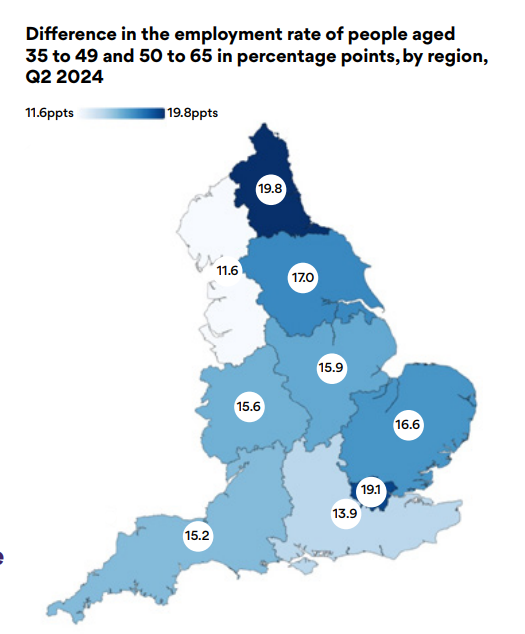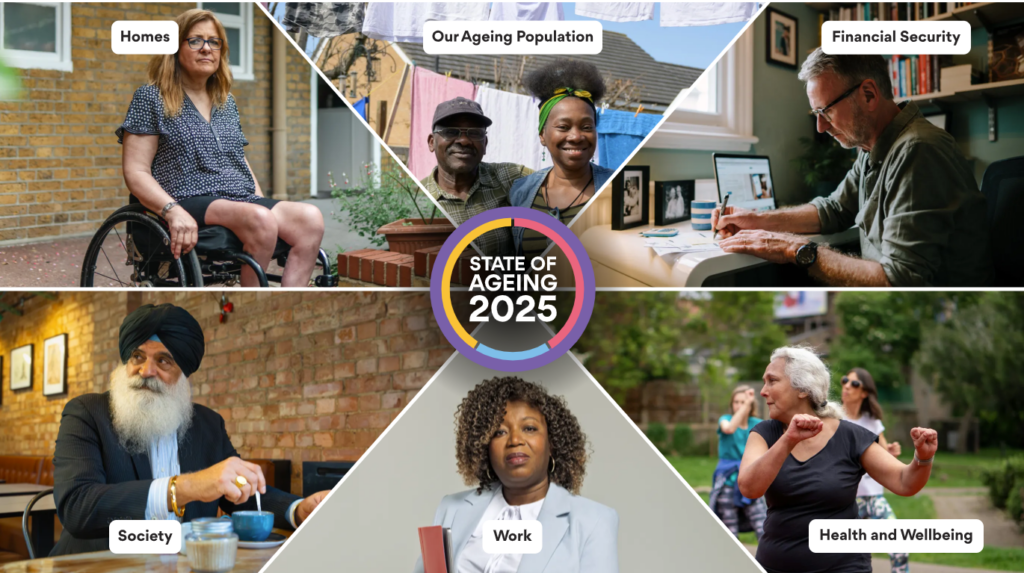The latest research by The Centre for Aging better, State of Ageing 2025 report finds that living in the poorest parts of England can cost you almost five years of your life.
We will be focussing on, and discussing the report findings in more detail over the coming weeks and months but you can click on the button below to read a detailed summary.
The regional picture of health, disability and caring is reflected in the regional picture of employment and poverty. This is because work, health and poverty are so intrinsically linked. Places with fewer work opportunities have higher levels of deprivation and therefore worse health. Poor health and caring responsibilities – both of which have the greatest impact on people from more deprived places – make it harder to work a full and uninterrupted career.
In fact, health problems are the main reason why people leave the workforce, although nearly half a million people aged 50 to 65 who have left work due to health reasons would return if the right support were in place.
In the UK the government has an aspiration to reach an overall employment rate of 80% (it is currently 75%)17. Other countries – namely the Netherlands, Switzerland and Iceland – have already achieved an 80% employment rate, but it is notable that they have a much higher percentage of people aged 55 to 64 in employment than the UK (75% in the Netherlands and Switzerland and 81% in Iceland compared with 65% in the UK)18. In fact, employment rates fall sharply after the age of 55 in the UK and it is clear that addressing employment levels among older workers is key to increasing the overall employment rate.
Moreover, the gap between the employment rate of people aged 35 to 49 and people aged 50 to 65 varies across the country, from 11.6 percentage points in the North West to 19.8 percentage points in the North East. Sickness is the main reason that people aged 50 to 65 are not in work (41% of this age group give it as their reason for not working) but this varies across the country.
Of people aged 50 to 65 in the South West who are out of work, just one in three cite their health as the reason compared with half in the North West, which is consistent with the fact that the prevalence of poor health is higher in northern regions. Nevertheless, 350,000 people aged 50 to 65 who are out of work due to sickness or disability would like to work. If the government is to meet its 80% target it will need to address these regional inequalities, and this will include ensuring that the right jobs and support are available for people with health conditions and disabilities who want to work.
In addition – and despite the State Pension age being equalised in 2018 – employment rates for women remain consistently lower than for men. Women aged 45 to 60 are seven times more likely than men in the same age group to have left or be considering leaving the workforce before the State Pension age to care for children or grandchildren (15% vs 2%). The employment gap between men and women also varies across ethnic groups. Only 20% of Bangladeshi women, 29% of Pakistani women and 55% of Chinese women aged 50 to 64 are employed compared with 65%, 68% and 70% of men with these ethnic backgrounds.
Although health is a major reason why people fall out of work as they age, discrimination on the basis of age has a huge impact on someone’s chances of being in employment. In our Effects of Ageism research, we found that almost one in five people had missed out on opportunities at work since turning 50. Employment support services achieve much worse outcomes for people aged 50 and over than for younger age groups, and the chances of a successful employment outcome decline with age.
Ageism interacts with ethnic, gender, health and socioeconomic inequalities to create unique barriers to employment for older workers, leaving some groups at particular risk of worklessness and poverty in later life.

What needs to happen...
National government: Commit to an employment rate target of 75% for people aged 50 to 64 by 2030, and provide a clear measure of progress in improving rates of employment among the over fifties during this parliament.
Local government: New Strategic Authorities and their Mayors to ensure that high standards for people in their fifties and sixties are built into the design of all local Get Britain Working plans and locally supported employment programmes to considerably improve access to work for people over 50.



